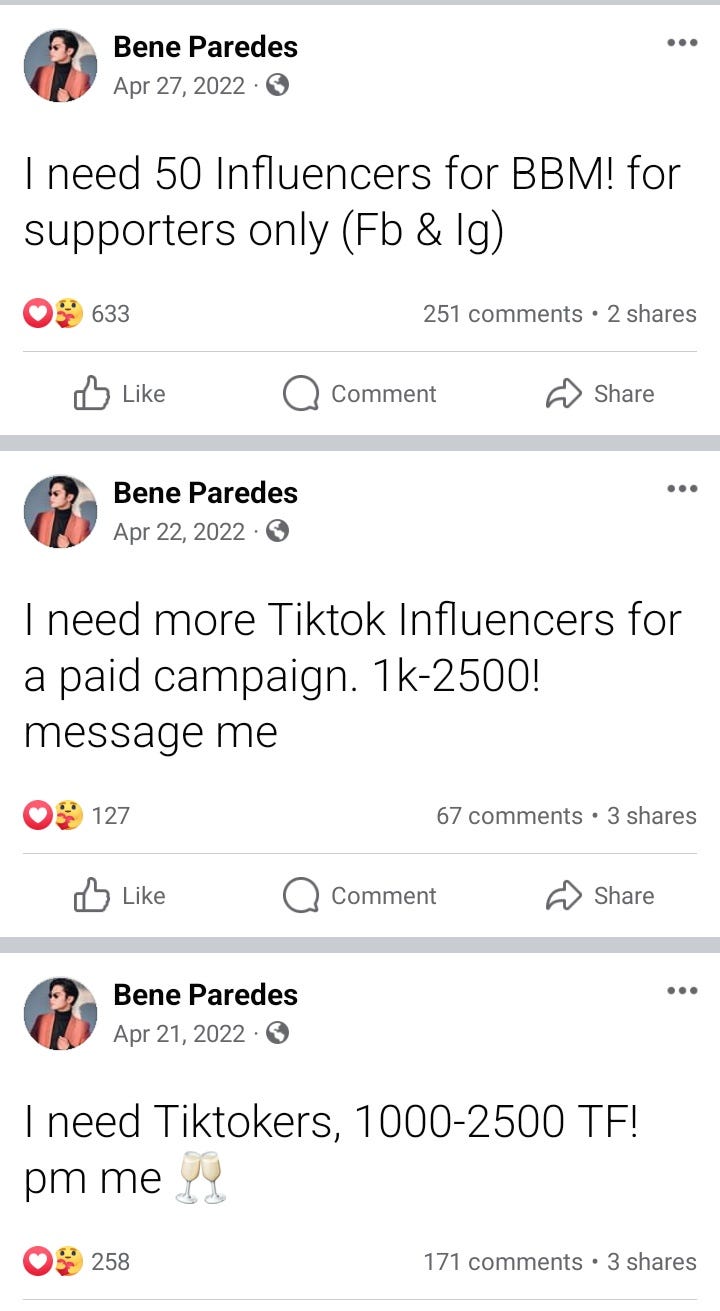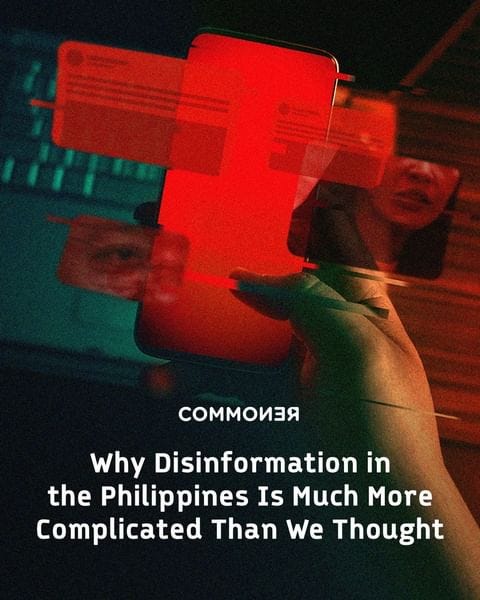Maggie Wilson’s exposé is a sobering reflection of our information landscape’s future
Campaigns against celebrities is the new frontier for disinformation in the Philippines. What happens now?
Written by JP Campos
It would be a lie to say that nobody ever envisioned that disinformation would eventually permeate beyond politics. Anyone who’s been following the disinformation space probably already had suspicions that it would only be a matter of time before media manipulation strategies that target politicians would eventually be used against non-political figures.
I didn’t say it publicly, however, because I didn’t want to give some people ideas by accidentally outlining a possible framework for disinformation operators. But the tell-tale signs have always been there: creators who are complicit in the operations, PR and advertising agencies who work with funders of disinformation, and oligarchs who donate to politicians who unethically manipulate public discourse.
So seeing this new frontier of disinformation emerge in the Philippines, where the target is not a politician but a celebrity, and where the core of the issue is more personal than political, comes not as a shock but as a painful reminder of how much we’ve yet to do as democratic society to address one of the world’s most urgent problems.
The story
On September 26, model and TV host Maggie Wilson, ex-partner of influential Filipino businessman Victor Consunji, took to Instagram to expose an alleged coordinated attack against her and her company. The videos were staged around the same time on TikTok, the third biggest social platform in the Philippines, and bore the same screenshots and a singular narrative that puts Wilson and her business in a bad light. The screenshots also showed the Instagram icon of Consunji’s current romantic partner, Rachel Carrasco.
Wilson and Consunji announced their separation in 2021. Since then, the high-profile couple has been at the center of various controversies, including news about their grievances, legal battles, warrants of arrest, and custody arrangements involving their son, Connor. The campaign to discredit Wilson is seemingly a part of this series of back-and-forth between her and Consunji’s party, although it is yet to be proven if Consunji actually had a hand in the campaign.
In her exposé, Wilson was able to obtain screenshots from the group chats of influencers who participated in the coordinated attack against her. According to the screenshots, influencers will be paid Php 8,000 (~USD 40) per video. They were also asked to give their own spin on the provided script. According to Wilson, an online content creator named Benedict Paredes was the direct coordinator, providing the influencers the script and posting instructions, while payments were disbursed by Mystee Ramirez, Jeff Sendrijas, and Kathy Villar. According to her online profiles, Villar is the Managing Director of BrandAide Inc., a marketing and advertising agency, while screenshots from Paredes’ page show that he has also worked as a coordinator who recruited online content creators to participate in President Marcos’ campaign in 2022. The activities behind the campaign is however unknown. Meanwhile, BrandAide Inc. has since deleted their Facebook and LinkedIn pages.


The operations behind the campaign against Wilson follows the traditional process of creating a disinformation operation: a party/funder taps an agency, then the agency, which will serve as one of the architects of the campaign, reaches out to middlemen. The middlemen or recruiters then reach out to content creators who will execute the tactics. It’s a hierarchy that has been talked about again and again. It has been tried and tested here and in other territories. But it’s only in recent years that we had testimonies from people who are right in the thick of the operations. But after Wilson’s exposé, we now have faces actually admitting to being agents of fake news and disinformation
Disinformation practices against celebrities are not exactly new.
We have seen Bill Hader transforming into Tom Cruise and Arnold Schwarzenegger, Keanu Reeves performing in ridiculous TikTok videos, and Nicki Minaj and Tom Holland talking about a home invasion by Mark Zuckerberg. All of these didn’t happen in real life, but were fabricated through deep fakes. Deep fake porn, which is one of the most severe applications of this technology, is also abundant on the internet, victimising mostly women.
During the height of Amber Heard’s case against ex-partner Johnny Depp, we saw a more sophisticated application of media manipulation against celebrities. Heard became subject of “trial memes” by “an army of bots” who seek to discredit her testimonies and character. TikTok videos that aim to ridicule Heard were also abundant. The memes spread everywhere, too: social media sites, late night talk shows, Instagram pages, and amplified by “men’s rights activists.” Many theorize that these tactics did not come out of nowhere, but were either paid for or encouraged by Depp’s public relations agency.
Now, in another part of the globe, Maggie Wilson is at the center of a disinformation campaign, allegedly waged by her ex-husband and his allies. If true, Wilson then is not only fighting her ex-husband–she is also at odds with his and his family’s bottomless pit of power.
Which would mean that the initial observations of disinformation researchers about the case of the Philippines still holds true: those involved in disinformation campaigns are primarily motivated by financial gain, rather than any particular ideology. Money enables them to influence a multitude of voices on the internet, ranging from media proprietors, vloggers, and pundits, to individual content creators looking for their next quick buck. The greater one’s wealth, the more control they can exert over the information ecosystem of the country–which has always been the case, even in the era of traditional media.
But with the advent of the internet, it has become even more conspicuous. The beneficiaries of media manipulators now include online content creators who are willing to lie for money, and what was once clandestine dealings under the tables of corrupt media proprietors now unfolds in digital group chats, and passed off as just any other commercial gig.
As we see now, issues concerning public figures no longer hinge solely on which narrative traditional information sources amplify. Even their rendition of the story can be manipulated by influential individuals.
Consider this: would you support a mere beauty queen or her billionaire ex-husband who is capable of providing substantial advertising revenue to your company? For media owners, this presents a precarious balancing act–one that usually favors the latter than the former.
Add to that the public relations surge that happens online and are made ubiquitous by online influencers which can (or at least try to) demolish high-profile reputations of personalities. The court of public opinion, for public figures, is a much larger–and perhaps more important–battleground where real power can be demonstrated.
I wonder then if Wilson's case will mark the end of disinformation against non-political public figures, or if the architects of the operations will just devise even more cunning methods to carry out their agenda. Afterall, we’ve seen the developments in how disinformation campaigns are carried out in the political scene. They can be more “creative” and evade traditional interventions such as fact-checking and content moderation. Such tactics can also be applied in non-political arenas.
I also wonder if the campaign against Wilson is but a display of power–a mere target practice–that sends a resounding message to anyone who has an ax to grind against powerful individuals and families, to say that there is no way they can win.
If that’s the case, then it would be a spectacular blow to our nation’s democratic aspirations.
Wilson, lucky for her, still has fame and money and influence to cushion the damages of the campaign brought against her. Her following was instrumental in correcting the course of her public battle against her adversaries.
But what about regular people, especially women, who wish to come out and expose an abuse of power that they’ve experienced? What about journalists wanting to publish a story about corrupt practices in big businesses? Now that we’ve seen what money can do against non-political figures, it would take not only immense courage but a confident arsenal, to go toe-to-toe with someone with outsized influence.
If you ask me, I believe that there is no going back from this. With the structure laid out, it is now easy for anyone with spare money to stage a disinformation campaign against their enemies. And it could happen on any scale.
We can only imagine future scenarios. A brand struggling to remain relevant resorts to paying off content creators to spread rumors against their competitors. An actor embroiled in controversy cutting favors with smaller influencers to bolster their position. A businessman accused of unethical behaviors calling upon paid influencers of their company to publish favorable stories about them. Etcetera, etcetera, the possibilities are endless.
Yet, it is worth paying attention to this new frontier of disinformation against celebrities and public figures because the attacks against them are not just on them as individuals. Public figures, even non-political ones, represent our values as a society, what we hold true and important, and what we think are worthy of emulating. Their private lives are not simple internet fodder, but realities that reflect parts of regular people’s lives.
When campaigns aimed to destroy a public figure’s reputation succeeds, it casts a wide net of damage. It affects the brands they’re associated with, the charities and non-governmental organizations they champion, and the social justice movements they support. While the impact is less significant compared to disinformation campaigns targeting political figures, it is by no means negligible. The harm is still palpable.
Worse, disinformation campaigns bleeding outside of its traditional arena puts us, regular spectators, at a significant disadvantage as it leads to an erosion of our abilities to distinguish between truths and falsehoods. We are trapped in the web of conflicting narratives–a contradiction, as the truth does not have versions.
In this landscape, the more creative, more convincing, and more abundant presentation of the story is more likely to be believed, and the real narrative is drowned out. It’s a pretty bleak and almost dystopian picture, made even more frightening by the fact that it’s occurring today and not in some distant future.
And as long as there are individuals and entities with vested interests driven by motives of persuasion or deception, we continue to be lost. We become disoriented and divided, ultimately making us even more susceptible to no longer share the same reality. Maggie Wilson’s exposé is a sobering reflection of the challenges we face today in the country’s information landscape.






nice article, JP. It's great you pointed out that continuum between the Marcos disinformation campaign managers and how they are involve in maggie wilson's smear campaign. I think you'll see how this is replicated in smaller provincial localities. I am curious about some of the trajectories of these content creators or influencers.. what happens to all those skills acquired post national elections? Partially, too, as a way to humanize them and their actions.